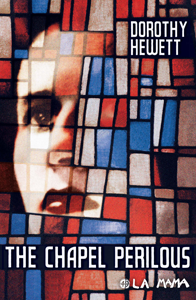"The course aims to provide students with an introduction to some of the major developments in Australian drama and theatre in the twentieth century. Works by key playwrights, for example Seymour, Lawler, White, Kenna, Hewett, Buzo, Nowra, Williamson, Romeril, Hibberd, Gow and Davis will be studied both theoretically and practically. The plays chosen represent the wide range of subject matter and theatrical form that is evident in the modern Australian dramatic repertoire. In order to contextualise the plays studied, some examination will be given to more important elements of the stage history of Australia covering the last 50 years.
This course is designed to provide students with the opportunity to study theory through its practical application."I'm looking forward to my late-starter introduction; particularly that last part. It seems we shall be learning by doing to some extent.
 |
| Dorothy Hewett: 1923 - 2002 |
The play felt familiar nevertheless. It is, as some might say, 'of its age' but that 'age' - the 1970s - was my coming of age; emotionally, intellectually, politically as much as physically or chronologically. That was the decade I was exposed meaningfully to theatre for the first time; outside of the school curriculum, beyond the mainstream stage, in a Scotland that was re-inventing its theatrical tradition. It was a place and period of radical, iconoclastic, typically left-leaning drama that could be, at its best, electrifying and challenging in both its form and content. But it was also, very often, brilliant, engaging, and blissfully alive; full of fun, laughter, and music as well as piercing observation, searing critique and sometimes anger. Plays like The Cheviot, The Stag and The Black, Black Oil (1973) by 7:84 - a touchstone for anyone of my time; The Slab Boys by John Byrne performed at the impeccable Traverse in 1978; the hugely talented Russell Hunter as Jock, a one-man play for BBC Scotland; much later there were fantastic works like Mary Queen of Scots Got Her Head Chopped Off by Liz Lochhead, anything by the Communicado Theatre Group really, or the Trav's adaptation of Irvine Welsh's Trainspotting. Those earlier plays, however, shared much of the Brechtian, destabilising verve of The Chapel Perilous.
So ... I was pleased to stumble over an article with the (somewhat unwieldy) title, The great Australian plays: The Torrents, the Doll and the critical mass of Australian drama in The Conversation online. Helpful pre-semester reading. It should assist my exploration of a largely unknown (to me) dramatic tradition. We shall see where that leads.




















